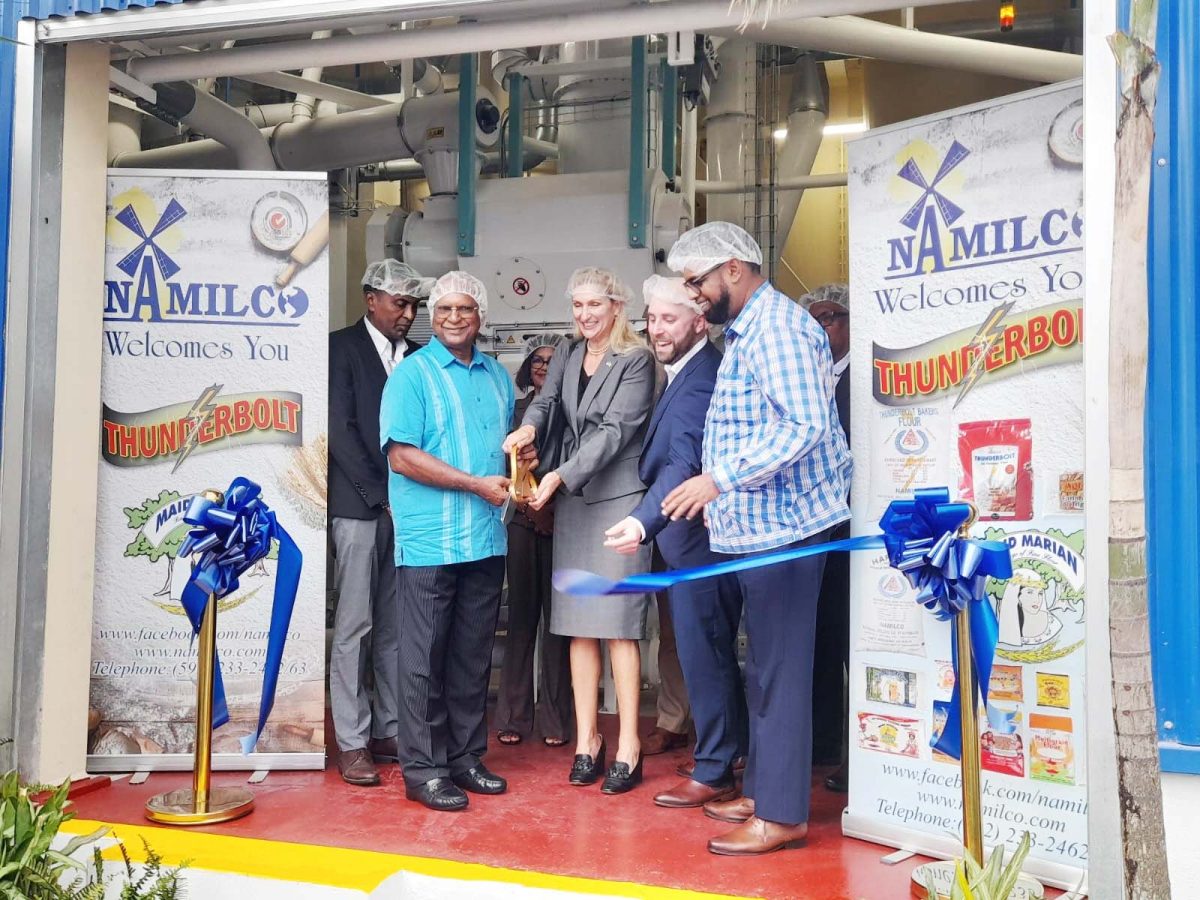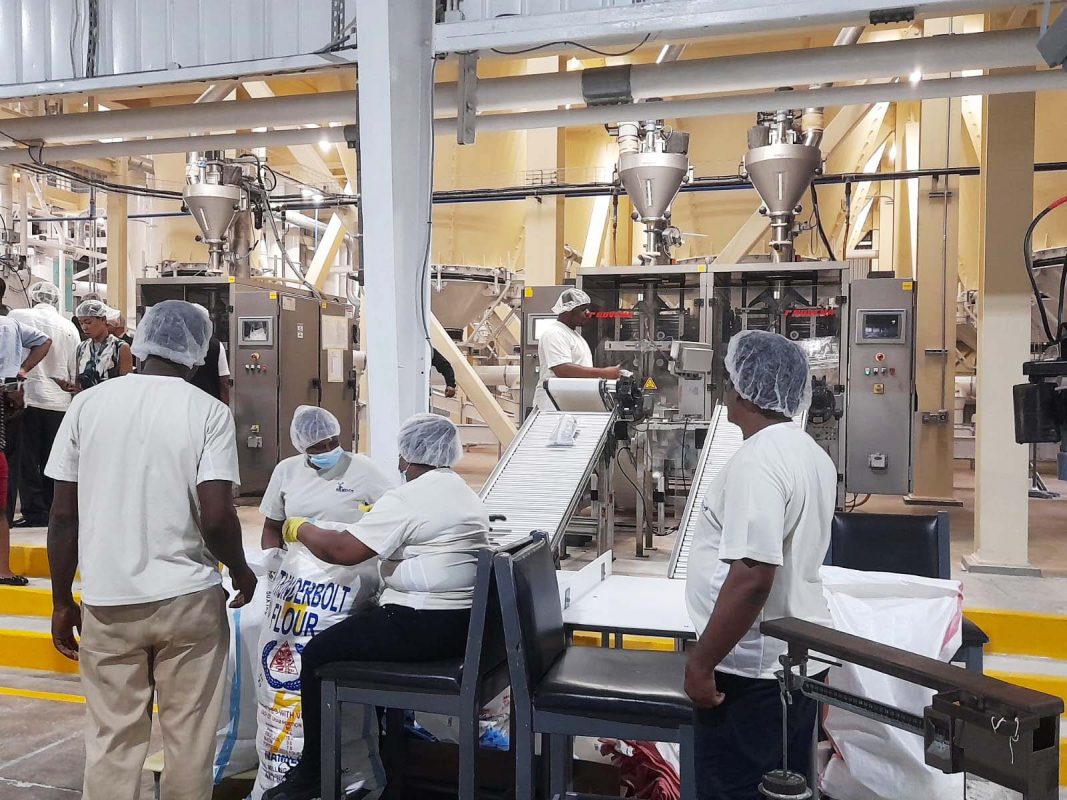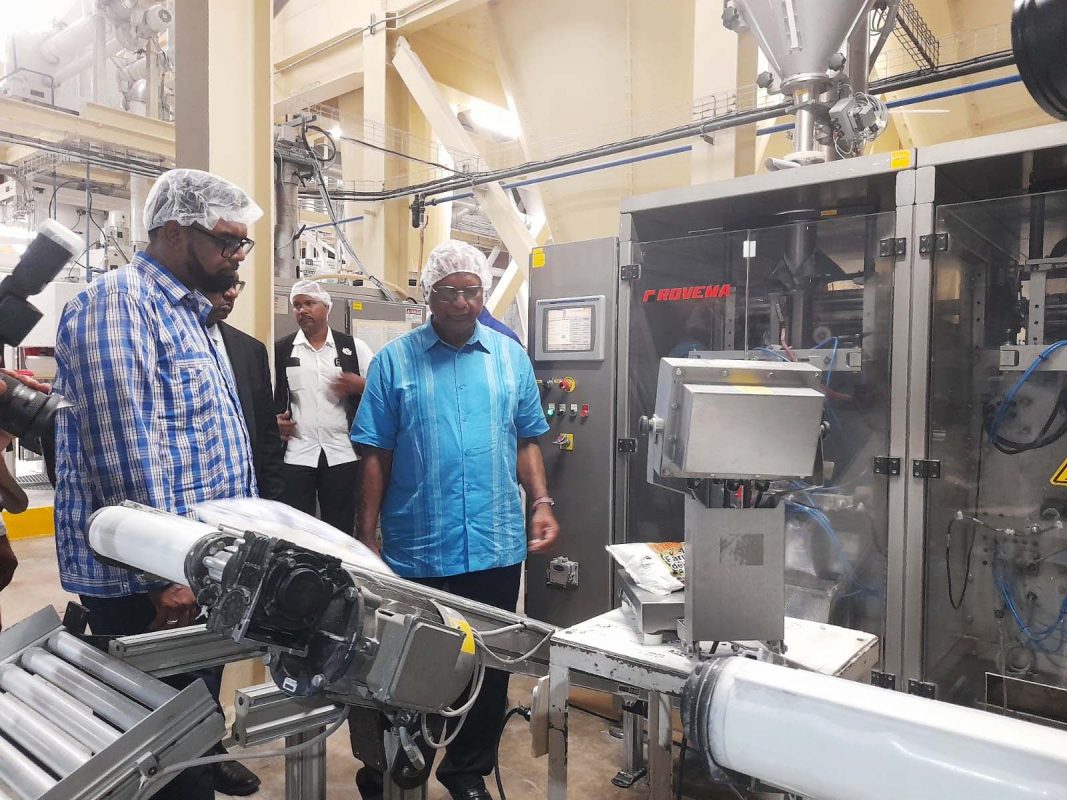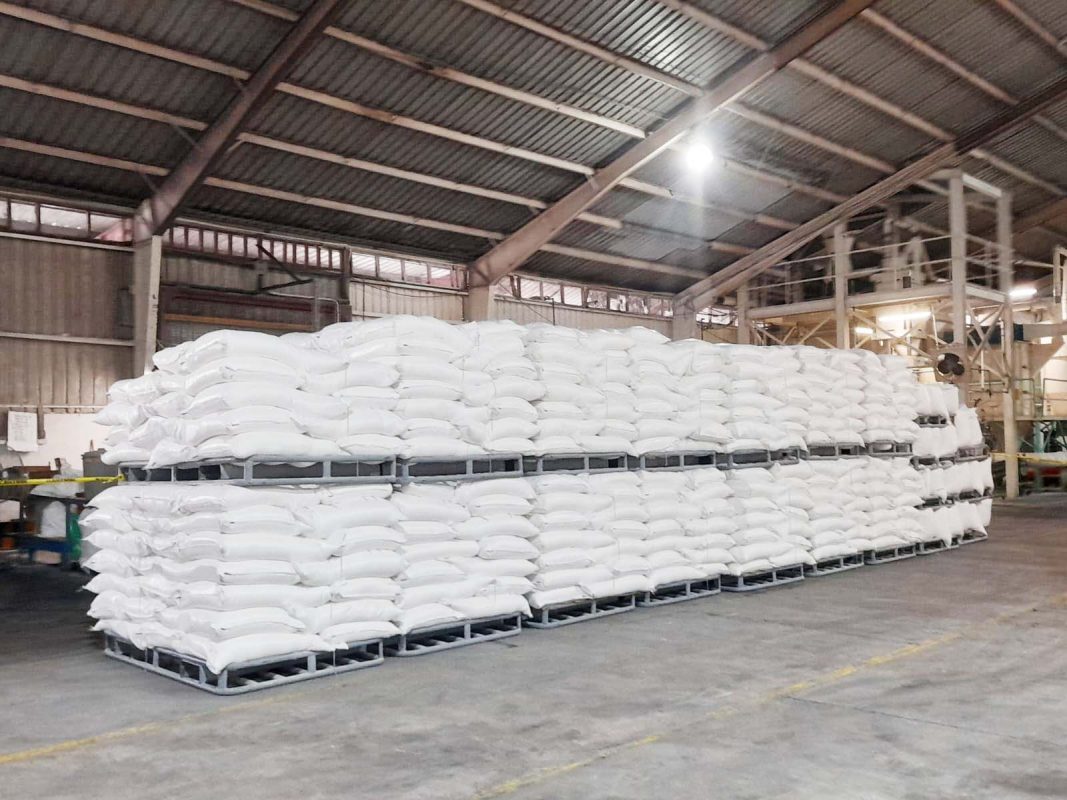By Joseph Allen
As the National Milling Company of Guyana (NAMILCO) marks 54 years of doing business in Guyana, the company yesterday introduced a $1.6 billion mixer plant at its Agricola, East Bank Demerara facility.
This plant, according to the company, is the result of three international companies and two local companies working over the past two and half years. It will run on a 24-hour basis, and is fully computerized.
The mixer is able to produce 20,000 kilogrammes of flour per hour with state-of-the-art ingredient feeders. The plant can also store some 700 metric tons of flour, which can supply the nation for 10 days.
NAMILCO says that their aim is to not only quality flour but one is which unique to each individual baking style.
The commissioning ceremony was held yesterday and attendees included President Irfaan Ali, Managing Director of NAMILCO, Roopnarine Sukhai; and US Ambassador to Guyana, Nicole Theriot.
In his remarks, Sukhai thanked everyone who contributed to making the project possible. He noted that the investment is needed and that the company has plans to expand its reach with another even bigger investment.
However, while the expansion is a definite fact, the director pointed out several issues that need to be addressed, hopefully with government intervention. Among these issues, he mentioned the supply of electrical power along with the need for accurate data to assist in investment planning.
“We understand the current power situation, and we hope this will be elevated as we plan for a new state-of-the-art mill and for expansion. As for company planning and due diligence for this project, good data is essential. Mr. President, I would like to know what is the per capita consumption of flour in Guyana, as compared to the US but for that we need to know the total consumption from the population census. While we know what we produce, we don’t know what is imported because that information is not readily available or accurate. At the moment all we know is that Guyana’s population is more than 750,000. We need an updated census and although we know the census is ongoing, we don’t know when it will be available publicly. We would like to invest in a new plant, as I alluded to earlier, but we need reliable data in order to make an informed decision. Surely an investment of some US$15 million for a new mill needs serious consideration and data to do proper diligence before that project is undertaken.”
The director also raised the issue of importers getting the better of the market due to a lower price tag on their flour due to several advantages.
“They say the grass is greener on the other side of the fence, hence, despite providing one of the finest flours in the Caribbean, we continue to see individuals purchasing flours from other parts of the Caribbean and Europe. On the surface, there is nothing wrong with that as we embrace competition. The problem arises when
foreign millers sell flour to local importers at a lower price than what they sell at a similar price in their home country.”
He also went on to mention that the high freight costs are also affecting the company.
“This issue has been raised at various levels and we hope that good reason will prevail. We are constrained from exporting our baker’s flour mainly because of the higher freight cost out of Guyana”, he said.
President Ali, who gave the feature address stated that while there is a negative side of things, one should also focus on the positive side of things in order to have an overall view of the current market space.
“Just as getting the right flour to the market requires the right mixture; success requires the right blend. And understanding the right blend through which that context is created. It is common knowledge that perhaps we have given you a platform in terms of fiscal incentives that is second to none in the regions and anywhere else. The speed and efficiency with which you have advanced that platform that was highlighted by my dear friend is second to none. When you look at the tax extensions that were given to this project and the other projects that you have done, I’m sure that it should have been a part of the equation you outlined earlier because it is these types of incentives and these types of fiscal framework that allows investors to invest and expand. If you didn’t have that enabling environment and framework then you would not invest.
“We have acknowledged that this is one of our greatest disadvantages – the cost of energy, reliability, efficiency, in this world, how clean that energy is produced and importantly at what cost. So, addressing the energy issue has a holistic framework. It cannot be a one-size-fits-all all framework. That is why the Amaila Falls Hydro Project was so important for Guyana… notwithstanding that, we acknowledge that for us to grow, the industrial sector, the manufacturing sector, the agro-processing sector, the value-added sector; we have to work on bringing down the cost of energy and that is why the gas-to-shore project is so important”, the President said
Ali reiterated that his government would cut energy costs by 50 per cent within two years through the gas to energy project so businesses should look to invest ahead of time.
He noted that while there are several issues, there is also a wide variety of others that have to be looked at in order for some to be fixed. He added that most of these lie outside of these borders but in spite of this, the Government of Guyana is working on fixing them.
“So, we don’t control that cost of transport and logistics. During COVID the cost for transportation went up by 100 per cent… in some cases. What did the Government of Guyana do? One of the first things we did, was recalculate the duties on commodities coming into the country. We give incentives on how that calculation was applied and that put back billions into importers’ pockets that was transferred to the consumers to keep to a large extent the price of flour at where it was.”
President Ali said that would have impacted the market directly. On the issue of information, President Ali stated that the company must work with the government and show details on their side of things so that help may come their way.
NAMILCO is a subsidiary of Seaboard Corporation of the USA. Prior to setting up here, Guyana imported flour from various suppliers.
Seaboard Corporation based in Shawnee Mission, Kansas City, USA, saw an opportunity to set up a flour mill in Guyana and negotiated with the government in 1967 to make this a reality.
The land was purchased in 1967 in Agricola, and construction by Taylor Woodrow & Associates and Ocrim of Italy, was completed in 1969. NAMILCO was officially opened on May 17, 1969 by the then Prime Minister Forbes Burnham. Seaboard owns, either wholly or in partnership, mills in Africa, Colombia, Ecuador, and Haiti.








